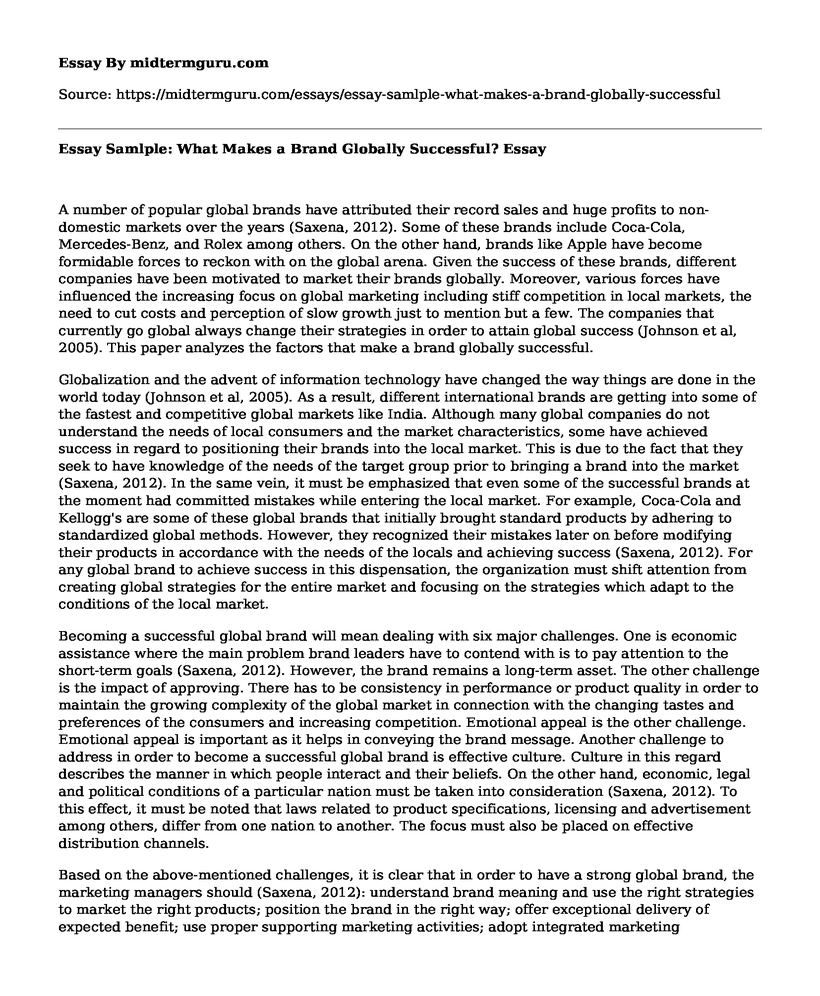A number of popular global brands have attributed their record sales and huge profits to non-domestic markets over the years (Saxena, 2012). Some of these brands include Coca-Cola, Mercedes-Benz, and Rolex among others. On the other hand, brands like Apple have become formidable forces to reckon with on the global arena. Given the success of these brands, different companies have been motivated to market their brands globally. Moreover, various forces have influenced the increasing focus on global marketing including stiff competition in local markets, the need to cut costs and perception of slow growth just to mention but a few. The companies that currently go global always change their strategies in order to attain global success (Johnson et al, 2005). This paper analyzes the factors that make a brand globally successful.
Globalization and the advent of information technology have changed the way things are done in the world today (Johnson et al, 2005). As a result, different international brands are getting into some of the fastest and competitive global markets like India. Although many global companies do not understand the needs of local consumers and the market characteristics, some have achieved success in regard to positioning their brands into the local market. This is due to the fact that they seek to have knowledge of the needs of the target group prior to bringing a brand into the market (Saxena, 2012). In the same vein, it must be emphasized that even some of the successful brands at the moment had committed mistakes while entering the local market. For example, Coca-Cola and Kellogg's are some of these global brands that initially brought standard products by adhering to standardized global methods. However, they recognized their mistakes later on before modifying their products in accordance with the needs of the locals and achieving success (Saxena, 2012). For any global brand to achieve success in this dispensation, the organization must shift attention from creating global strategies for the entire market and focusing on the strategies which adapt to the conditions of the local market.
Becoming a successful global brand will mean dealing with six major challenges. One is economic assistance where the main problem brand leaders have to contend with is to pay attention to the short-term goals (Saxena, 2012). However, the brand remains a long-term asset. The other challenge is the impact of approving. There has to be consistency in performance or product quality in order to maintain the growing complexity of the global market in connection with the changing tastes and preferences of the consumers and increasing competition. Emotional appeal is the other challenge. Emotional appeal is important as it helps in conveying the brand message. Another challenge to address in order to become a successful global brand is effective culture. Culture in this regard describes the manner in which people interact and their beliefs. On the other hand, economic, legal and political conditions of a particular nation must be taken into consideration (Saxena, 2012). To this effect, it must be noted that laws related to product specifications, licensing and advertisement among others, differ from one nation to another. The focus must also be placed on effective distribution channels.
Based on the above-mentioned challenges, it is clear that in order to have a strong global brand, the marketing managers should (Saxena, 2012): understand brand meaning and use the right strategies to market the right products; position the brand in the right way; offer exceptional delivery of expected benefit; use proper supporting marketing activities; adopt integrated marketing communications and remain consistent; determine consumer perception of value and come up with a pricing strategy; promote credibility and the right brand personality; support innovation and ensure that the brand remains relevant; strategically design and execute a brand hierarchy and portfolio; and adopt a brand equity management framework to make sure that marketing functions portray the concept of brand equity (Saxena, 2012).
In conclusion, it is clear that with the stiff competition in the world today, global firms must work harder to make their brands successful. As local companies look to be major players within the global markets, a major hurdle they contend with is building global brands. The importance of building brands is not in doubt. With the wages rising as a result of economic development, it would be unsustainable to only compete on cost. Though brands might, in essence, translate into premium prices, it must be noted that they assist organizations to achieve greater market share as they provide an assurance of not just reliability but exceptional quality. The strength of the brand relies on consumer perception. Customers who are satisfied and loyal demonstrate positive views about a brand. At a time when the competition gets stiffer, it is incumbent upon organizations evaluate factors which are crucial in creating strong brand equity and help them in attaining customer loyalty and contentment.
References
Johnson, G., Scholes, K., Whittington, R. (2005). Exploring corporate strategy. Text and cases, seventh edition. Pearson Education Ltd., London
Saxena, S. (2012). Challenges and strategies of global branding in the Indian market. IOSR
Journal of Business and Management (IOSRJBM), 4(1), PP 38-43
Cite this page
Essay Samlple: What Makes a Brand Globally Successful?. (2021, Jun 04). Retrieved from https://midtermguru.com/essays/essay-samlple-what-makes-a-brand-globally-successful
If you are the original author of this essay and no longer wish to have it published on the midtermguru.com website, please click below to request its removal:
- Corporate Social Responsibility: Organizational Learning and Change Management
- Personal Safety at Good Shepherd Hospice - Essay Sample
- Barriers to TQM Strategies in King Abdul Aziz University Hospital
- Discussion Questions on Business Administration - Paper Example
- Examination of the Plight Market in Nigeria - Paper Example
- Articles Analysis Essay on Transformational Leadership
- Project Management: Maximizing Efficiency with Minimum Costs - Research Paper







